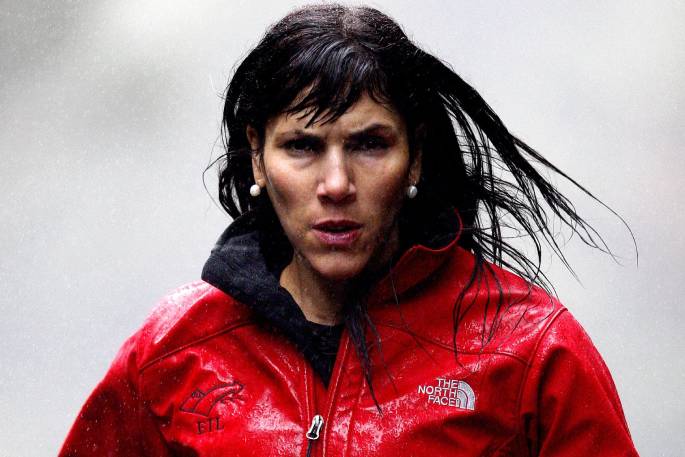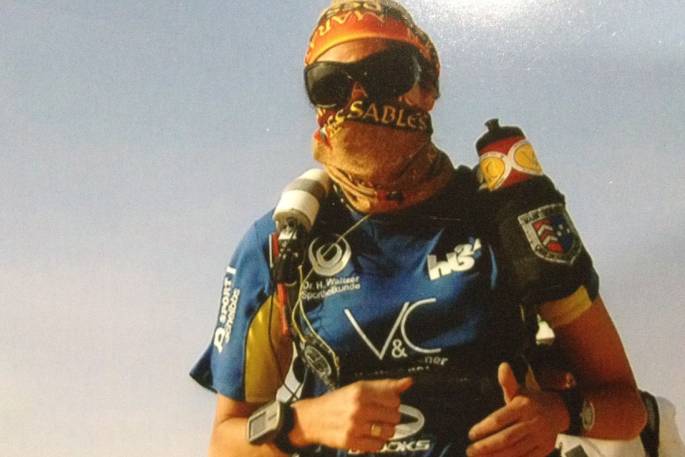One of New Zealand's greatest ultrarunners says it's awesome to see people hitting the streets in huge numbers during lockdown but has urged them to have a training plan.
Throughout her 25 year career, Lisa Tamati competed in over 140 ultramarathons around the globe, totalling over 70,000km of running.
She retired five years ago and is now a coach alongside her business partner Exercise Scientist Neil Wagstaff to over 700 athletes.
Running is one of the few activities New Zealanders can do at all Alert Levels and Tamati says it is common for people to get into running and go too hard, too soon.
'I've dedicated my life to running all over the world, and it's one of the most rewarding sports you will ever get into,” says the 52-year-old from Taranaki.
'But most runners don't come to us until they are injured. Everyone thinks that running is easy and that you put one foot in front of the other and it's a simple thing: You buy a pair of shoes and then off you go.
'It's not. It's a skill like ballet that you need to work on and perfect. You need good form, you need strength and mobility, you need a coach and a properly structured plan.”
Marathon season has arrived. Between now and late November (Covid-19 permitting), there are a number of marathons on around Aotearoa including the Auckland, Tauranga, Wellington, Queenstown and Dunedin marathons and a ton of ultramarathons.
ACC data shows from 2016 – 2021 (31 July) there were 81,845 claims accepted for running related injuries which cost $52.6 million to help people recover.
In 2020, there were 14,294 new claims accepted for running injuries, which cost $10.2 million. The number of new claims was the highest since 2017 and the cost was the highest in the last five years.
On the back of Covid-19 lockdowns, there were 4111 running injuries in Spring 2020 (September, October, November) – the highest since 2016.
'This is encouraging as the popularity of running events and running for general fitness seems to be increasing,” says ACC Injury Prevention Partner Natalie Hardaker.
'Alert Level 3 and 4 are the ideal time to get into running, but it's important to have a plan so you can make the finish line. Make sure you build into your training slowly.”
From 2016 – 2021 YTD (31 July), the 40-44 age group had the most running related injury claims (9,712) ahead of 25-29 (8,669) and 35-39 (8,575).
Of the 14,294 injury claims for running in 2020, 13,136 were soft tissue injuries (92 percent), 457 (3 percent) were punctures/ cuts or stings and 314 (2 percent) were fractures and dislocations.
Every year ACC invests around $80 million into injury prevention.
"We want to support all Kiwis in doing the sport and activity they love, and good physical preparation combined with rest and recovery will help you stay injury-free and achieve your goals," says Hardaker.
Tamati hosts the health, fitness and medicine podcast 'Pushing the Limits” – a globally top 200 ranked show and is an experienced international speaker. She says stress promotes injuries.
'When you're stressed, your body is tighter, your immune system is down and your digestive system isn't working as well. Learning to manage our stress levels is so important.”
Tamati is currently coaching people in the corporate environment because she says New Zealanders are stressed like never before during COVID-19.
'I've been a speaker for around 15 years and these days I get so many requests on stress management and resilience. People are really struggling right now.
'Getting out in the elements for a run is great for your mental health. We need to be out in nature, in the sunshine and pushing ourselves. It's part of our DNA and is hugely beneficial to our mental and physical wellbeing.”
Tamati says it's common for ‘weekend warrior' runners to sign up for a marathon or half marathon without a plan. They try to cram in their training and end up injured and demoralised.
'Your fitness is really hard won. When you get an injury, you're back to scratch again so preventing injuries is so important.”
She says it's good to know if you get injured, your rehab costs may be covered by ACC.
'It's an amazing system and fantastic back up to have for New Zealanders in their life should things turn to custard,” she says. 'We're lucky to have it.”

Conversely, she says the feeling when you cross the finish line at the end of a long-distance event is indescribable.
'When you achieve something that you set out to do it lifts the horizons to what you think you‘re capable of and helps you be stronger and more resilient,” she says.
'Invariably you find yourself asking yourself what next? If I achieved that then you take on something else and that carries over in other parts of your life.
'When you hit the finish line, you will remember this time during lockdown and how you stuck to your plan to achieve something that challenged you.”
Lisa Tamati's tips for injury prevention:
· Talk to a running coach – Downloading a plan off the internet is not doing it right. You need a personalised coaching plan to ensure your training programme is tailored to you, your lifestyle, age, injury profile and goals.
· Shoes – When you can, go to a store where the staff know how to fit running shoes properly. Shoes that are too small will cause blisters and shin splints and other injuries. Also have the right shoes for your environment, trail or road.
· Warm up - Most people work eight hours at home, chuck their shoes on and then run slow for the first few minutes. That is not a warm up. You have been in a sitting position all day. Hip flexors have shortened and your hammies have overlengthened. You need to straighten everything, activate the muscles and open them up. A dynamic warm up will improve performance and make running more enjoyable, not to mention prevent injury.
· Strength / Mobility / Balance – Go to a gym if you can or have some basic pieces of kit at home like a kettle bell,resistance bands, maybe a TRX and a foam roller or shakti mat. People don't have time for a one hour yoga class every day, but you do have time for 10 minutes of mobility work at home. Make it a habit. Do yoga, foam rolling and get a massage if that is within your means.
· Nutrition – Eat whole, unprocessed foods and don't overdo the simple carbs. Avoid eating additives and preservatives. Getting your electrolyte balance right is important.
· Warm down – Put aside time to stretch after your run. Build recovery days into your programme. The gains come during sleep and rest times, not during the actual training. Don't forget that the next time you are tempted to overtrain and under-sleep. See what Lisa Tamati and Neil Wagstaff do at www.lisatamati.com For more information on general injury prevention information for sport Home » ACC Sportsmart



0 comments
Leave a Comment
You must be logged in to make a comment.